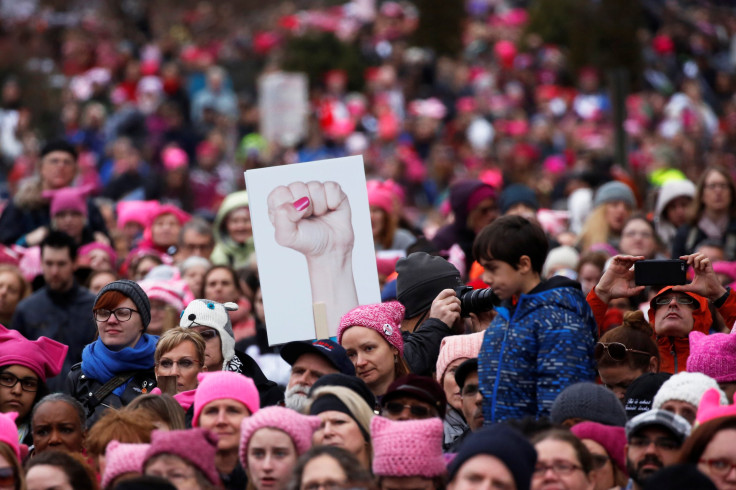What Happened At The Women's March? These Are The Conservatives Who Tried To Stop The Washington Protests

WASHINGTON -- They waved signs that read "Black Lives Matter: Rent a Riot" and "AIDs: Judgment or Cure?" The group of older men and women, donning all black uniforms with Psalms embroidered on their shirts, stood in the middle of the street Saturday during the historic Women's March in Washington, D.C., offering a counter message to the crowd of at least half a million people gathered to defend civil rights for all.
Haley Arata and her friends had come prepared. The four women drove from William Mary University in Virginia with a large painted sign they were planning to use against any hate groups intending to rain on their parade. The students joined the rally, pinpointing the exact location the religious group set up so they could hold their own message upon a pink and white canvas right in front of them: "Queer Power."
Student activists drown out hate speech group with "Queer Power" sign at the D.C. #WomensMarch pic.twitter.com/XoS0qsIXDY
— Chris Riotta (@chrisriotta) January 21, 2017
"We definitely saw this coming," Arata told International Business Times, her back turned to the anti-Women’s March protestors who were hurling profanities toward her. "We think the best action to take is not to engage, but instead to be the pro-choice, pro-LGBTQ, pro-women, pro-human rights voices in the crowd, no matter what’s happening."
"Are you even a woman?" One religious protestor shouted at Arata as she held her sign in front of him. "She's probably a trannie, you can't even tell anymore," another responded.
Organizers announced the Women's March in Washington In November just days after Republican Donald Trump was declared the winner of the presidential election. Sister rallies were organized in cities across the world. The global event was billed as an opportunity to stand up to the policies of conservative lawmakers who challenge abortion access, gay marriage and other liberal values. By the time the event kicked off Saturday, the national mall in Washington had become a sea of pink hats, rainbow flags and messages calling on the next White House administration to protect women's rights and equality over the next four years.
For Arata and her friends, it was largely a friendly crowd. The college students and their message was met with massive support from passersby, all of whom rebuked the religious group for attempting to disrupt the event heralding women's rights. March participants chanted, "love trumps hate" and "God loves all."
It wasn’t the first time counter protestors have attempted to obstruct anti-Trump demonstrations since the Republican candidate’s successful 2016 presidential election. Arata and her friends designed the massive display immediately after former Secretary of State Hillary Clinton’s defeat to bring to post-election rallies for months to come to stand up to anyone with an opposing message.
"The [religious protestors] show up to every one of these events we’ve been to since the election," Arata told IBT. "It’s hard, since they have loudspeakers and never stop, but we’re trying our best to lift people’s spirits. We think it’s good for people to see our resistance against hate."
Just a small view of the massive crowd rallying for the #WomensMarch in DC. The front stage is five blocks away. pic.twitter.com/RGD5rrDt2q
— Chris Riotta (@chrisriotta) January 21, 2017
Women of all shapes and sizes are out in DC for the historic #WomensMarch pic.twitter.com/GU1MNdyXm2
— Chris Riotta (@chrisriotta) January 21, 2017
© Copyright IBTimes 2025. All rights reserved.





















